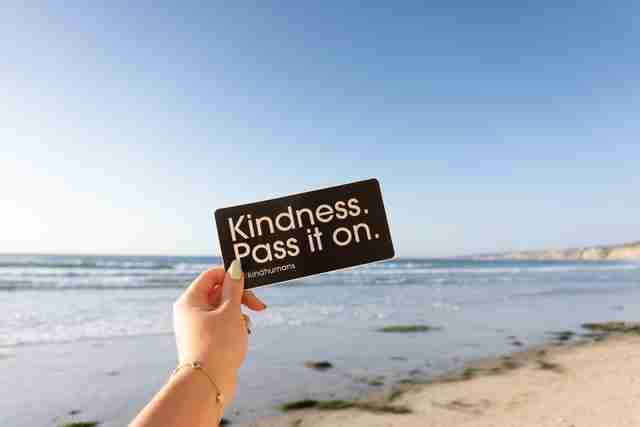
It’s a curious thing, kindness. The more you exhibit it to others, the larger it is amplified when it comes back to you. When we make others feel good, we feel good. Positivity is the ultimate return on investment. The advantages of compassion extend far beyond positive feelings. It has health benefits too. A study published in Integrative Psychological and Behavioral Science (1998) found that perpetually kind people have 23% less cortisol (the stress hormone) and age slower than the average population. It’s true that showing a little compassion yields dividends in calmer feelings and being optimistic.
What is Kindness?
What is kindness? The dictionary defines kindness as the quality of being friendly, generous, and considerate. Most of us would agree that kindness is a desirable trait to look for in friends and family and society in general. It improves the quality of life within our relationships, workplaces, and communities. To really impact the world though, we can’t simply expect kindness from others. It’s our responsibility to cultivate kindness in ourselves. To properly define kindness, one must express it in both words and action.
Luckily, acts of kindness don’t have to be big grand gestures to have an impact on your health and well-being. Endorphins, your body’s natural painkillers, are produced in your brain through small acts of kindness too. All it takes is choosing to consciously pay attention to opportunities to show kindness. Whether it’s picking up litter from the road, or writing a thank-you letter to a teacher or mentor in your life, when you begin to sow the seeds of kindness, increased feelings of self-worth are likely to follow.

Being kind is both an easy and a hard thing. It’s easy to be kind when you’re in a good mood and with people you know and like and in places you are familiar. When life is flowing smoothly and you’re in your comfort zone, kindness comes easily and often without any great thought or effort at all. When you’re feeling overwhelmed, frustrated, or otherwise challenged though, kindness can often fall lower on the list of priorities. In dire circumstances, it can fall right off the list completely.
Make kindness a priority
So how can you make sure that kindness remains a priority in your life? As with any other interpersonal skill, the first step is awareness. With the realization that you want to integrate more kindness into your life for personal and community benefits, the next step is to look for opportunities to be kind. Rest assured, once you start looking there will be no end to the possibilities.
The world is full of opportunities to show kindness close to home and around the globe, so don’t get too caught up in the choice because it’s important to move to the next and final step. Which is, of course, to act on those opportunities. Whether you offer to do an extra chore at home, volunteer for a community organization, or donate to a fundraiser, don’t just think about it. Make sure you sign up and do what you need to follow through.
Once you start developing the habit of looking for and following through on opportunities to show kindness in your world, it should be fairly easy to continue on that path. Just be sure that you don’t overextend yourself and offer to do more than you can manage. Being kind includes being kind to yourself, after all. However, if you do get knocked off course and find yourself feeling impatient and lacking compassion for others, it may be a sign that you’ve let kindness slide off your radar. You’ll need to work through the three steps of awareness through action to regain your balance and to reap the rewards of kindness again.



Leave a Reply